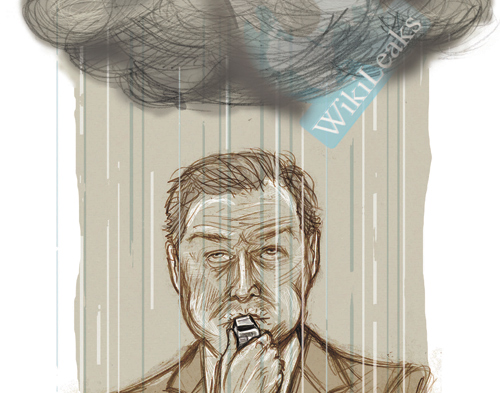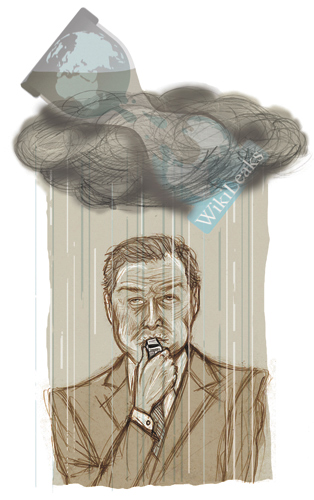WikiLeaks furor causes defeat of rights bill with Las Vegas ties
A bill aimed at enhancing federal whistle-blower protections appeared poised to pass Congress last month on the strength of years of aggressive lobbying and strong bipartisan support. But skeptics of the measure found something even more potent to derail it: WikiLeaks.
The defeat of the Whistleblower Protection Enhancement Act, which Senate Majority Leader Harry Reid's office called "crucial legislation," was perhaps a sign of the chilling effect on lawmakers of WikiLeaks' recent online publication of thousands of secret government documents. Or as supporters of the bill assert, it was an act of political gamesmanship.
In touting the need for stronger whistle-blower rights, open-government advocates have cited the cases of former Las Vegas-based Department of Homeland Security officials who lost their jobs after alleging agency abuses. A Review-Journal story in 2008 examined how Las Vegas air marshals who got in trouble with the law fared better in the workplace than agents who filed whistle-blower disclosures.
Tom Devine, executive director of the Government Accountability Project, said the bill offered federal workers safe internal channels to report waste, fraud, and abuse and, contrary to what some lawmakers thought, did not provide protections to employees who leak sensitive information to WikiLeaks or other entities outside the government.
"The attack (on the bill) erased a safe alternative to WikiLeaks," Devine said. "Whoever opposed it is either not reading the bill or is engaging in a shameless bluff that no one else will read it."
Devine's group represents former Las Vegas-based air marshal Robert MacLean, who has spent five years challenging his dismissal from the Transportation Security Administration for revealing a plan to cut back security on flights during a time when the agency was warning of a heightened risk of terrorist attacks using commercial planes.
The dispute over the bill shows the power of WikiLeaks to affect public policy. And it has caused politicians and the media to choose their words carefully when describing the group.
In the days following WikiLeaks' November release of 250,000 U.S. State Department cables, news outlets wrestled with how to define the brainchild of Julian Assange. Many, including The Associated Press, used a variation of the term "whistle-blower." But within a few days, AP re-evaluated this description and began referring to WikiLeaks as "a website that specializes in displaying leaked information."
Despite an implied connection with WikiLeaks, the Whistleblower Protection Enhancement Act had built enough momentum by the end of Congress's lame-duck session to seem assured of passage. It had the support of the Obama administration and lawmakers on both sides of the aisle.
On Dec. 10, the bill sailed through the Senate without opposition and went on to the House where, after several delays, it unanimously passed in an amended form that excluded national security employees from any of the new protections. That amendment was prompted by House Republicans who suggested the bill might encourage WikiLeaks-style dumps of classified government information.
After the House vote, the bill, in a milder form than the one that had already passed the Senate, went back to that chamber for a final vote.
Devine was so confident of passage that he was deciding what kind of champagne to buy.
But then something unexpected happen: An anonymous senator quashed the bill by putting a hold on it before leaving Capitol Hill for Christmas break. The senator who blocked the whistle-blower bill was permitted to remain anonymous because the hold came at the tail end of a session.
Last week, the practice by which any senator can put a secret hold on a bill, effectively killing legislation without debate, was banned by the Senate in a 92-4 vote. Sen. John Ensign of Nevada joined three other Republicans, Jim DeMint of South Carolina, Mike Lee of Utah and Rand Paul of Kentucky, in voting against the rule change.
Ensign said Friday he voted against the change because it did not include a provision that would afford senators more time to read bills brought to the Senate floor before deciding whether to block them or allow them to proceed.
Ensign added he was not the senator who placed a hold on the whistle-blower bill.
The debate over the whistle-blower bill continues.
The staff of Darrell Issa, a California Republican who became chairman of the House Committee on Government Oversight and Reform at the start of Congress' new session earlier this month, took to social media in December to link the bill to WikiLeaks. "We need to make sure future Wikileakers aren't empowered/protected with our best allies/citizen-watchdogs: true whistleblowers," read a posting on Issa's Facebook page.
In the days after the failure of the whistle-blower bill, the Project on Government Oversight, a Washington-based government watchdog group, posted an article titled "How a Red Herring about WikiLeaks Killed Whistleblower Protections."
"After an unbelievable roller coaster of fear and fallacies, votes on and off, and a flurry of activity, when the lights went out in the Capitol Building on December 22, the Whistleblower Protection Enhancement Act was dead," the project's Angela Canterbury wrote. "It may be one of the few times in history when legislation has passed both chambers unanimously within two weeks and still failed to get to the president's desk."
Issa earlier this month reaffirmed his opinion that a whistle-blower bill needs to address the activities of WikiLeaks.
Reid's office is pledging to keep the bill in play.
"The Whistleblower Protection Enhancement Act is an important piece of legislation that will improve transparency and accountability in government," Reid spokesman Zac Petkanas said. "While Sen. Reid is disappointed that Republicans blocked a bill that received unanimous support only last month, he will work to pass this crucial legislation during (this) Congress."
Devine, who got his hopes raised during the lame-duck session, does not plan to give up.
"The WikiLeaks chaos creates new urgency to pass legislation," Devine said. "If federal workers try to work within the system of professional checks and balances to report waste, fraud, and abuse, it almost guarantees professional suicide."
Devine points to the experiences of air marshals in Las Vegas as evidence of his claim. An internal investigation of working conditions at the local air marshals office was completed several years ago and is considered a key piece of evidence in whistle-blower retaliation cases. To date, the Department of Homeland Security has declined to release the 575-page report, citing privacy concerns.
Former Las Vegas air marshal P. Jeffrey Black has filed a federal lawsuit against the agency and has alleged the department has violated the Freedom of Information Act by withholding the report.
Stephens Washington Bureau Chief Steve Tetreault contributed to this report. Contact reporter Alan Maimon at amaimon@reviewjournal.com or 702-383-0404.


















